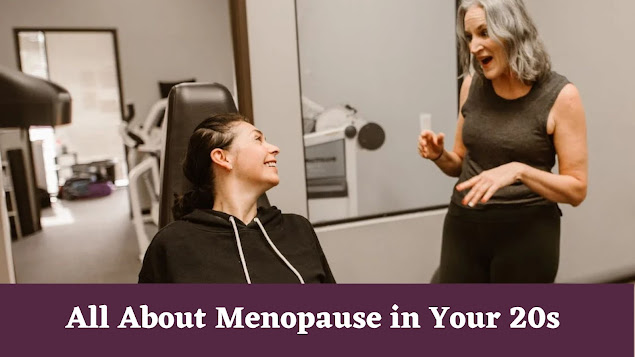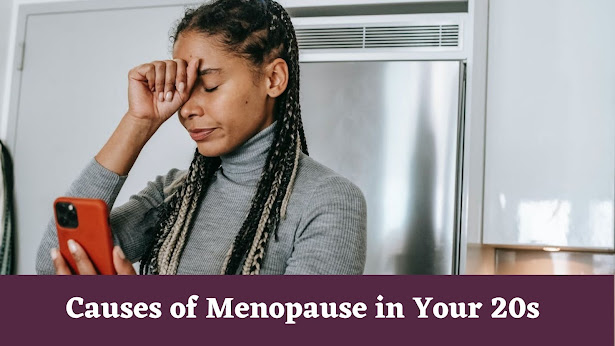All About Menopause in Your 20s
Menopause starts for utmost people in their late 40s or early 50s. But in early or unseasonable menopause, the drop in estrogen product and the end of menstrual ages comes much earlier.
unseasonable menopause begins before the age of 40, and can occasionally be in
your 20s. still, you may have questions
and enterprises about its goods on your health, If you’re in your 20s and
unseasonable menopause. In this composition, you can read about the symptoms of
early or unseasonable menopause, what can beget it, and what can be done to
treat its symptoms. You’ll also learn about the goods unseasonable menopause
can have on your health.
What's unseasonable/early menopause?
Menopause is a premature Source when it occurs before age 40. unseasonable menopause is occasionally called primary ovarian insufficiency because the ovaries stop producing estrogen the way they should. However, you’re going through unseasonable menopause, If you’re in your 20s and going through menopause. unseasonable menopause is different from early menopause, which refers to menopause that happens before you’re 45 times old. The average age for menopause in the United States is 51 times old.
A 2019
exploration review showed that around 3.7 percent of women witness
either primary ovarian insufficiency or early menopause.
What are the symptoms of unseasonable menopause?
The symptoms of
unseasonable menopause are the same as those you’d witness if you started
menopause latterly. But it’s important to note that menopause symptoms can vary
from one person to another. Some of those symptoms include
Hot flashes
Night sweats
Trouble sleeping
Lower coitus drive
Body pangs And headaches
Trouble concentrating or
fastening
Trouble flashing back effects
Vaginal blankness
Painful coitus
Weight gain
bone loss
Changes in your cholesterol
situations
Mood changes
What causes unseasonable menopause?
It isn’t always possible to
determine exactly what has caused unseasonable menopause. These are some of the
known causes and threat factors.
Family history
unseasonable menopause can
run in families. However, you may want to speak with your natural cousins about
the age at which they stopped having ages If it feels applicable. Knowing about
their symptoms could help you get a sense of what to anticipate.
Smoking
Smoking is associated with
earlier menopause. 2018 research shows that the further someone
smokes, the more advanced their threat of unseasonable menopause. An
exploration review from 2020 including some mouse studies shows
that-cigarette vapors also affect reduplication. But scientists don’t yet know
how smoking cigarettes affects menopause.
Ovarian surgery
Pelvic or ovarian surgery
is occasionally the cause of unseasonable menopause. You may have had a surgery
called an oophorectomy to remove your ovaries because of cancer, endometriosis,
or another condition. However, your symptoms may be more severe than if you
started menopause more gradationally, according to 2019 research Trusted
Source, If surgery has caused you to go into menopause.
Exposure to poisons
People who have had
chemotherapy or radiation remedy to treat cancer have an advanced threat of
unseasonable menopause. A 2015 study also looked at exposure to certain estrogen-dismembering
chemicals. It set up that exposure to substances set up in some fungicides and
phthalates also gives you an advanced threat of earlier menopause.
Viral infections
Some contagions have been linked in a 2015 exploration review to unseasonable menopause, though their part isn’t clear. HIV
mumps,
cytomegalovirus,
tuberculosis,
malaria,
and other contagions may potentially beget ovarian
changes and unseasonable menopause.
Auto-immune diseases
 |
| Click Buy Now |
Autoimmune diseases can occasionally damage the ovaries, bringing about unseasonable menopause. Some conditions associated with unseasonable menopause include
Graves ’ complaint of rheumatoid arthritis
Crohn’s complaint myasthenia gravis systemic lupus erythematosus multiple sclerosis
inheritable differences
2019 exploration set up
that further than 75 different genes can contribute to primary ovarian
insufficiency and unseasonable menopause. utmost care genes that impact how
ovaries develop and serve, how cells divide, or how DNA is repaired in the
body. Turner pattern and fragile X pattern are inheritable conditions that can
beget unseasonable menopause.
What are the implicit health enterprises of unseasonable menopause?
unseasonable menopause poses some health
pitfalls. It’s a good idea to talk with a healthcare professional about these
pitfalls so that you can take them away to cover your physical and emotional
health going forward. Then are some implicit health issues that can arise
Heart complain.
Lower estrogen situations
can beget changes in your blood vessels and your heart, conceivably leading to
an advanced threat of heart problems.
Anxiety, depression, and
other mood changes.
Hormone changes can also
beget some significant emotional shifts. Anxiety, depression, and lower tone-
regard aren't uncommon.
Eye conditions.
Around 79 percent of
menopausal women in a 2021 study by Trusted developed dry eye complaints
and other conditions that can affect the face of the eye. It’s worth noting
that symptoms are generally worse in aged grown-ups.
Gravidity.
It’s harder for people in
unseasonable menopause to come pregnant naturally. Working with a fertility
specialist may help.
Hypothyroidism.
For some people, hormones produced by the thyroid gland drop after
menopause, which can beget changes in metabolism and energy situations.
Osteoporosis. Lower estrogen situations can occasionally weaken bones and make
them more susceptible to fractures.
How is unseasonable menopause diagnosed?
Primary ovarian
insufficiency is frequently diagnosed when someone talks to a healthcare
professional about missing several periods. However, it’s a good idea to talk
to a doctor if you have missed three or further ages in a row.
Then’s what to anticipate during the opinion.
some questions about your family history,
since unseasonable menopause can run in families tests to check your estradiol,
follicle-stimulating hormone, and anti-Mullerian hormone situations tests to
find out if other conditions, similar to hypothyroidism, are affecting your
ovaries still, you may have a pelvic ultrasound to see if a cause can be
determined If your doctor thinks you may have primary ovarian
insufficiency.
How is unseasonable menopause treated?
Unseasonable menopause can
not yet be reversed, but experimenters are trying to ameliorate the outlook.
Treatments have different pretensions, similar as reducing your menopause symptoms guarding your heart, bone, and sexual
health furnishing emotional support
connecting you with fertility specialists if you want to come pregnant Your
treatments options could include hormone
relief remedies comforting or remedy regular wireworks to be sure your heart,
bones, and thyroid are healthy
What about children?
endless unseasonable
menopause may affect your capability to have children.
Be sure to bandy with your doctor all available options, including
in vitro fertilization
egg indurating
surrogacy relinquishment
Chancing support for unseasonable menopause
 |
| Click to Buy Now |
It can be a shock to witness menopause in your
20s. In fact, for numerous, unseasonable menopause comes with mixed feelings,
including sadness, anxiety, and frustration.
This change can be
especially hard if your plans include gestation and parturition since
unseasonable menopause can make it harder to have children. ” Whether you’re passing physical, cerebral, or
emotional symptoms, it’s important to take good care of yourself during this
transition. Suppose about whether a therapist, a nutritionist, a support group,
or other specialists could profit you.
These are some places where you may be suitable to find support
Fertility for Colored Girls
The Daisy Network
healthtalk.org
The Broken Brown Egg
Fertility musketeers
mortal Fertilisation and
Embryology Authority
The Cade Foundation
Oshun Fertility
Resolve
The North American
Menopause Society Practitioner Finder
Final word
unseasonable menopause,
occasionally called primary ovarian insufficiency, happens when your ovaries
stop producing as important estrogen, your ages stop, and it becomes more
delicate to come pregnant naturally.
unseasonable menopause brings on all the symptoms generally associated with menopause —
night sweats,
mood changes,
attention difficulties,
lower libido,
and more.
And
because unseasonable menopause can alter your life plans and your sense of
tone, it’s not uncommon to witness depression and anxiety along with the other
symptoms.
Treatment may help with
your symptoms. Hormone relief remedies, while not right for everyone, may also
help with bone loss and heart problems down the road.
A healthcare professional can help you decide what treatments are right for you. Menopause in your 20s can be unanticipated. Though you may feel insulated by the opinion, you aren't alone in dealing with it. As soon as you're ready to reach out, you can find the professional guidance and particular support you need.
This card was created with the hCard creator.








